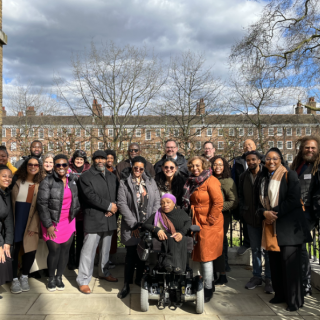In addition to IES Abroad's DACA resources for students, we wanted to share this insightful interview and irrefutable call to action from former IES Abroad Assistant Director for Special Initiatives, Diversity Recruiting & Advising Hernando Sevilla-Garcia. In this interview, Hernando explores the crucial importance of diversity, equity, inclusion, and antiracism initiatives with a focus on the Latinx community. Hernando is currently a Diversity, Equity, and Inclusiveness Consultant at EY; here, he examines the origins of his dedication to this work and considers obstacles such as sociopolitical constructs, unconscious biases, accessibility, and more.
We connected with Hernando to learn more about the vision he holds and he shared the urgency of the movement and immediate work, emphasizing that the need for attention to students that have been granted DACA (Deferred Action for Childhood Arrivals) poses not only many opportunities for the Latinx community, but for marginalized groups as a whole. In this way, Hernando's work and mission coincides with many of the objectives IES Abroad aims to accomplish: creating a culture and reality of inclusivity, community, and global good.
IES Abroad: Give us a little backgroud information into your call to action with DACA students. What is your focus and what do we need to know?
Hernando Sevilla-Garcia (HSG): First and foremost, I am an educator seeking to expand international academic opportunities, strategizing with administrators at Minority-Serving Institutions. Establishing more inclusionary and equitable policies is my passion. However, as a first-generation Colombian immigrant, I learned that I must constantly examine my privilege and unconscious biases in my work with students. As I was conducting a Gilman Scholarship writing session at the University of Texas Rio Grande Valley one day, I realized that a central component of the Tu Mundo interactive workshop was excluding an entire demographic of students. The very first eligibility requirement of the Gilman Scholarship was “a citizen of the United States.” This meant that as I highlighted this opportunity to students, those present whose immigration status did not fall under this paradigm and include the privilege of citizenship were being left out.
It was in this moment that I knew that in order to stay true to the meaning of inclusion, Tu Mundo necessitated equity-focused programmatic changes. More importantly, it inspired me to set out and garner support for a specific group of students: DACA (Deferred Action for Childhood Arrivals) students. As international educators, myself included, we must ensure that the unjust systemic barriers that continue to marginalize entire populations do not spill over to academic experiences such as study abroad. Through fully funded scholarships and leveraging of technology via virtual/remote learning experiences we can all begin to make international academic opportunities a reality for DACA students. This is our collective duty.
IES Abroad: How have you reinforced the importance of DACA within your previous work with IES Abroad?
HSG: In order to be truly inclusive, it is of utmost importance to acknowledge that even within marginalized communities there are voices that are relegated to the sidelines. In my work with Hispanic-Serving Institutions through Tu Mundo, one of the main components of this interactive workshop was excluding DACA students. I realized that programmatic changes were necessary so that DACA students were taken into account.
IES Abroad: What opportunities could virtual internships offer to DACA recipients?
HSG: While I believe that in-person study abroad and virtual opportunities should be considered as separate yet equally meaningful international academic opportunities, the pandemic showed the importance of remote learning as a valuable component of our field. Virtual internships, for instance, provide DACA students an alternative to traveling for study abroad. For those that may not choose or be able to receive Advanced Parole, I believe remote-learning demonstrates the potential to eradicate persistent inequities that exist in our field.
I often think of Sergio Rodriguez, a DACA student himself, and the advice he provides regarding virtual internship opportunities. There is also the powerful example of Carolina De Anda who, although not a DACA student, proudly identifies as a Mexican immigrant. Through her virtual internship with IES Abroad Santiago, Carolina published her research titled “Women Empowerment in Public-Political Spaces in Chile and Mexico” with Amassuru. Sergio and Carolina are constant reminders of the power of study abroad and I am certain that their stories will inspire not only other DACA students, but other marginalized identities who do not yet see themselves represented in study abroad.
IES Abroad: We’d love to hear about your values and how you incorporate them into the diversity and inclusion work you’re involved in, what are some of those values and how can students learn from them?
HSG: Even as a first-generation Colombian immigrant with intersectional identities that are constantly contested in my professional and academic worlds, I also hold unconscious biases that I must “keep in check” in order to truly apply the concepts of equity, inclusion, and antiracism in my daily life. Simply put, even if you are part of a minoritized group we must always acknowledge that marginalization may exist even within our own communities. For instance, antiblackness and machismo in the Latinx community need to be discussed.
IES Abroad: What is something that an individual could do in this present moment to educate themselves on Latinx identity?
HSG: Familiarize yourself with the sociopolitical issues most relevant to this community: immigration reform, support for Hispanic-Serving Institutions, or the disaggregation of the Latinx community as a whole (due to the diversity within the notion of Latinindad from cultural practices based on national origin or voting patterns) are some examples.
"All in all, I hope that this call to action to support DACA students is taken into consideration by the field of international education as a whole. From IES Abroad, to NAFSA and the Forum on Education Abroad. From Minority-Serving Institutions to the Ivy League, to individual faculty members and entire state-wide university systems. The time is now."
IES Abroad: What is something you wish was discussed more regarding the Latinx experience?
HSG: Many in this country consider the Latinx experience as a monolithic one. From labeling us as the “Sleeping Giant” political bloc (a faulty assumption that we all vote the same way) or that immigration reform is something supported by all are just two examples of how the Latinx community is often treated through a “one-size-fits-all” approach. Latinidad is a nuanced concept and there needs to be more Latinx representation in all corners of society to elucidate the diversity that exists within this community.
IES Abroad: Is there any social change or trends that you’ve been particularly proud of or excited by in the name of DEIA?
HSG: Increased support for Minority-Serving Institutions.
IES Abroad: Personal stories can motivate our personal and professional missions in the world. How does your story tie into your mission?
HSG: I had to leave my native country of Colombia due to the sociopolitical instability of the 90s. While incredibly grateful for the opportunities I have been afforded in the United States, I realize the immense privilege this entails and acknowledge that many in my country and from the Latinx community of which I am a proud member of do not. As such, my mission is to fight for those whose humanity is denigrated and seek to provide the very same opportunities I have had to others in my community.
We commend Hernando for his unwavering commitment to recrafting the narratives and opportunities for the Latinx community and communities beyond. Hernando continues his work with DEI in his current role, and we couldn't be more proud and thankful that he will persist with this important work within other organizations.
To learn more about IES Abroad's work with DACA students, visit our DACA Resources page.




